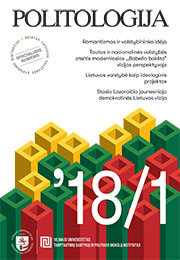Stasio Lozoraičio jaunesniojo demokratinės Lietuvos vizija
The vision of a democratic Lithuania of Stasys Lozoraitis jr
Author(s): Gintautas GrigonisSubject(s): Diplomatic history, Political history, Recent History (1900 till today)
Published by: Vilniaus universiteto leidykla & VU Tarptautinių santykių ir politikos mokslų institutas
Summary/Abstract: Stasys Lozoraitis Jr. is of one the most influential Lithuanian diplomats of the 20th century, having served as chargé d’affaires in Rome and as head of the Lithuanian diplomatic service in exile. S. Lozoraitis Jr. maintained his status as a vital figure of the independence movement and thereafter during the early years of independence as an ambassador to the United States. Although S. Lozoraitis Jr. never published extended written work or explained his political views in detail, numerous public speeches, congratulation letters, interviews and notes become a significant source of information when attempting to analyze particular political views and the theoretical outlook that the diplomat had and used as guidance in his goals of Lithuanian national sovereignty, the reinstatement of democracy and international recognition. The purpose of this article is to analyze the aforementioned historical sources, kept in the Lithuanian Central State Archives and published in separate works, in an attempt to form a coherent picture of the principles of democracy as interpreted by S. Lozoraitis Jr. and how these principles should apply to Lithuania, as it gains its independence from the Soviet Union. The first chapter delves into the Lithuanian diplomatic service during the last decades of the 20th century, the challenges it faced and how the role of the said organization was envisioned by the chargé d’affaires S. Lozoraitis Jr. The diplomatic service was in a unique position during the period of the Soviet occupation, as its duty was to represent a state that was essentially erased from the map. While larger, more powerful states see diplomacy as a supplementary tool, according to S. Lozoraitis Jr., smaller states such as Lithuania relied on their diplomats far more. The LDS, while in exile, is seen as a symbol of the fight for independence for the natives having their fight at home. The second chapter details three primary principles of democracy and how they fit into the image of a sovereign Lithuania. The first principle is the plurality of opinion, which is held as a certain ontological principle that is inherent in life. Human life, according to S. L. Jr., is based around a variety of opinions and attitudes; an open society is simply crucial for a healthy democratic process. Rebuilding societal ties shall be one of the main challenges for independent Lithuania. The second principle is freedom, which is essential for human self-expression. Freedom, in a way, permits the flourishing of the plurality of opinion; therefore, both of these principles are interlinked. The third principle – law – ensured that the former two principles are not violated and can flourish in a democratic society. Law guarantees both the plurality of opinion and freedom as well as freedom both domestically and internationally. Despite the fact that the theoretical and normative outlook of democracy of S. Lozoraitis Jr. at first seems quite eclectic, after an in depth analysis, it can be concluded that all three of aforementioned principles are interlinked and help maintain a healthy democratic order and society as well as ensuring peace among its neighboring nations, which is seen a primary international goal for an independent Lithuania.
Journal: Politologija
- Issue Year: 2018
- Issue No: 1(89)
- Page Range: 90-105
- Page Count: 16
- Language: Lithuanian

